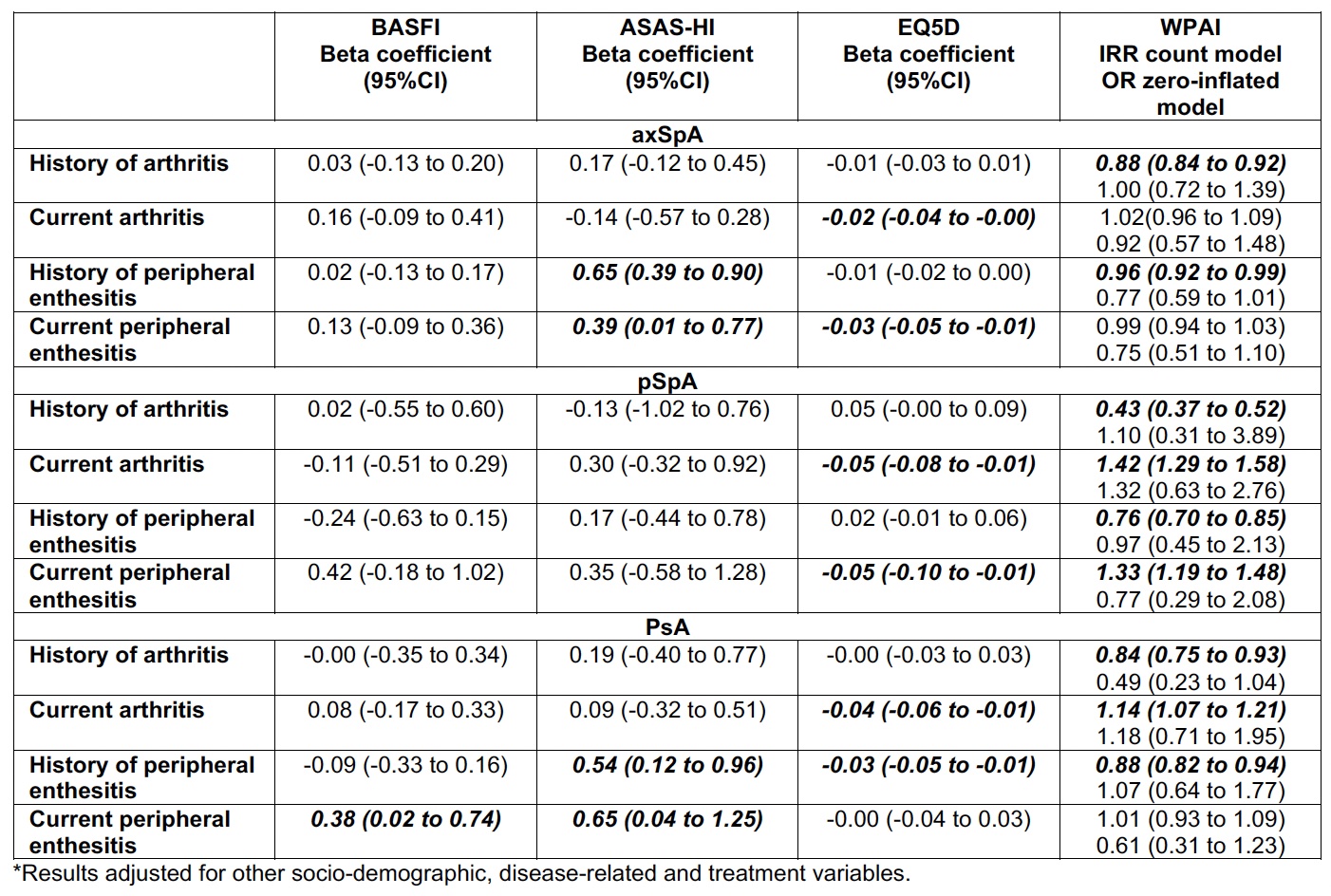Session Information
Date: Saturday, November 16, 2024
Title: SpA Including PsA – Diagnosis, Manifestations, & Outcomes Poster I
Session Type: Poster Session A
Session Time: 10:30AM-12:30PM
Background/Purpose: Peripheral musculoskeletal manifestations can occur either concomitantly with axial disease or independently in patients with spondyloarthritis (SpA). However, it is not known whether the impact of peripheral manifestations on disease outcomes is different across the SpA phenotypes (axial SpA (axSpA), peripheral (pSpA) and psoriatic arthritis (PsA)). The aims of this study were: a) to determine the independent impact of the presence of peripheral manifestations on various disease outcomes in SpA; b) to investigate potential differences in this impact across SpA phenotypes.
Methods: Patients from the cross-sectional ASAS-PerSpA study with axSpA, pSpA or PsA were included. The impact of peripheral involvement (i.e., history of peripheral arthritis, current peripheral arthritis, history of peripheral enthesitis, current peripheral enthesitis and history of dactylitis) on BASFI, ASAS-HI, EQ5D and WPAI was assessed in multivariable models (zero-inflated model for WPAI and linear mixed models with random effects for the other outcomes, with “country” as a random effect) encompassing all the peripheral manifestations as the main variables of interest. Finally, analyses were stratified by disease phenotype.
Results: A total of 4185 patients (2719 axSpA, 433 pSpA, 1033 PsA) were included. Multivariable models showed that history of arthritis exclusively affected WPAI, while current arthritis influenced both the EQ5D and WPAI. A history of peripheral enthesitis impacted on ASAS-HI, EQ5D and WPAI, while current peripheral enthesitis affected all outcomes, including the BASFI (Table 1).
After stratification, multivariable analyses showed very similar results across SpA phenotypes. The impact of history of arthritis on the four outcomes was very similar in axSpA, pSpA and PsA, as well as the impact of current arthritis. Similarly, history of peripheral enthesitis and current peripheral enthesitis showed very similar results across phenotypes (Table 2).
Conclusion: Patients with SpA with peripheral manifestations have significantly worse function, health, and work productivity. Notably, this impact is very similar across the different phenotypes of SpA.
To cite this abstract in AMA style:
López Medina C, Molto A, Capelusnik D, Ramiro S. Impact of Peripheral Manifestations on Function, Health, and Work Productivity in Patients with Axial Spondyloarthritis, Peripheral Spondyloarthritis and Psoriatic Arthritis. Data from the ASAS-PerSpA Study [abstract]. Arthritis Rheumatol. 2024; 76 (suppl 9). https://acrabstracts.org/abstract/impact-of-peripheral-manifestations-on-function-health-and-work-productivity-in-patients-with-axial-spondyloarthritis-peripheral-spondyloarthritis-and-psoriatic-arthritis-data-from-the-asas-perspa/. Accessed .« Back to ACR Convergence 2024
ACR Meeting Abstracts - https://acrabstracts.org/abstract/impact-of-peripheral-manifestations-on-function-health-and-work-productivity-in-patients-with-axial-spondyloarthritis-peripheral-spondyloarthritis-and-psoriatic-arthritis-data-from-the-asas-perspa/


